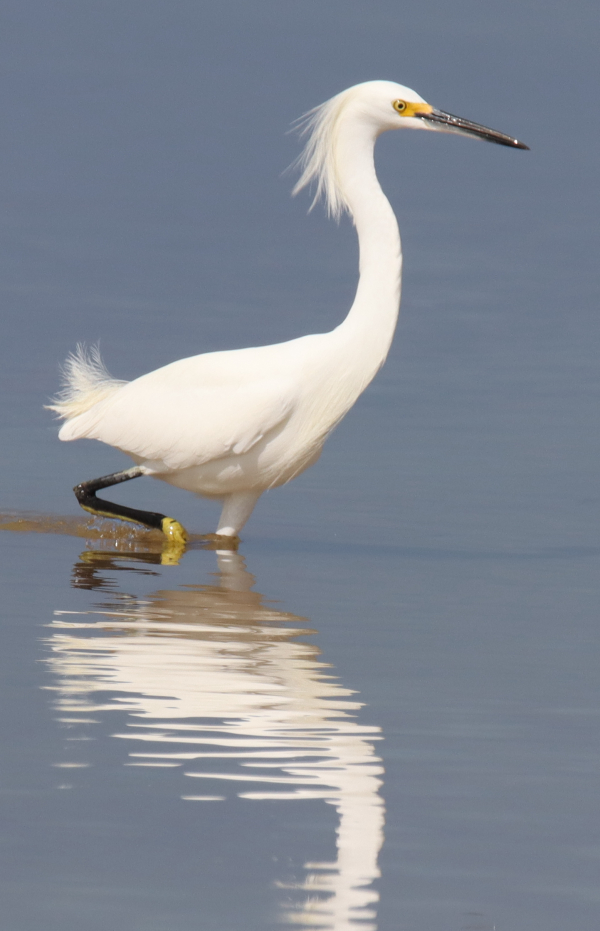
How quickly can you ascertain the difference between a Snowy Egret, Great Egret, or Cattle Egret? Birding appears to help improve a number of brain functions, including memory and learning (photo by Paul Konrad).
|
At Harvard University, associate professor Rose Goldman incorporates bird identification into her Practice of Medicine class to help sharpen students’ clinical diagnostic skills. During lectures, for example, Goldman asks students to differentiate between a Great Egret and a Snowy Egret by focusing on details such as size, beak shape, and foot color that distinguish the long-legged, long necked, similar white species. Goldman, an avid birder, also leads students on birding outings.
At first, it might not seem like cardinals and carcinomas have anything in common, but Goldman believes the process of differentiating between similar birds isn’t all that different from examining the subtleties of a patient’s rash to determine whether to treat eczema or test for skin cancer. “I personally feel that my powers of observation and memory have really improved from birding, but I have no way to prove that,” Dr. Goldman explained.
With her unique teaching strategy, Goldman is using something that neuroscientists know well: Gaining deep expertise in a subject area can change your mental scaffolding, literally rewiring your brain. To better understand this process, brain and memory researchers have long turned to birders (and occasionally medical students) as a go-to group of test subjects – even in foundational cognitive research.
As the door opens new avenues of perception and cognition research, birders continue to participate. According to Thomas Palmeri, a Vanderbilt University neuroscientist who has recruited volunteers through the American Ornithological Society and local Audubon chapters, birders make excellent subjects because it’s easy to find enthusiasts with a wide range of skill levels, and they are more likely to participate in community science bird surveys.
In his work studying visual expertise and memory retrieval, Dr. Palmeri ran his subjects through a series of bird identification tests. He used the data to build computer models that simulate real-time decision-making processes in the human brain. What’s useful, he said, is that all birds share the same broad set of features - feathers, beaks, 2 feet, 2 wings – but they are still incredibly varied. To identify a specific warbler or hawk, a birder might spot and synthesize its markings, colors, silhouette, shape, movements, and sounds in seconds. “It’s about identifying a specific species and even subspecies,” Palmeri explained.
Developing this kind of perceptual expertise shifts the patterns of firing brain cells, or neurons, according to Dr. Isabel Gauthier’s research results. The more a person learns and practices, the more often a signal moves between neurons, and the path becomes easier to traverse, like a familiar hiking trail. This phenomenon, called neuroplasticity, may enable experts to distinguish between objects more quickly, seeing them as a whole and ignoring distracting or superficial features, she noted.
Over time, topic expertise can even change the structure of the brain itself. Parts of the cerebral cortex may become slightly thicker as a person’s visual and auditory know-how increases. This makes it easier for experts to add new information to their mental repertoire, said Erik Wing, a neuroscientist at the Rotman Research Institute in Canada.
Wing, a birder himself, studies how these changes influence memory. In a research study published in 2022, Wing recruited birders of varying experience levels and asked them to identify images of both familiar and non-familiar birds. The results demonstrated that long-term knowledge of avian species helped people to more easily remember new birds. For example, an experienced Boston birder visiting San Francisco might be unfamiliar with local species at first, but thanks to their neural scaffolding, expert birders will have a relatively easier time learning, and may even retain knowledge better as they age, Dr. Wing noted.
So, can medical students in Rose Goldman’s class improve their diagnostic skills by birding? Possibly, but the correlation isn’t direct. Even so, breaking open a field guide could help uncover innate skills in perception. For example, a person who has a knack for birding might also be gifted in a visual diagnostic field, like dermatology or radiology. And vice versa: Someone who naturally gravitates toward the visual side of medicine might be a sharp birder. Dr. Wing’s research also suggests that developing the frameworks and tools for birding helps a person sharpen their focus in other areas. “If you get practice tuning your attention toward different features that are more diagnostic or less diagnostic,” Wing added, “that is, I think, a valuable thing.”
Whatever is at work in their brains, a number of Harvard students continue to enjoy birding since completing Dr. Goldman’s class. For them, in addition to getting outdoors and tuning in on birds, birding has become an indispensable outlet for dealing with medical school stress. Some have even been sharing their hobby with classmates by leading a student birding club. One student, Lynn Hur, shared: “I’m in a busy part of my medical education right now, but I do carry my binoculars in my backpack at all times.”
This article originally was published in the current issue of Audubon magazine as “The Birding Brain Boost,” and you can refer to the associated website-based article at Yes, Birding Does Change Your Brain | Audubon